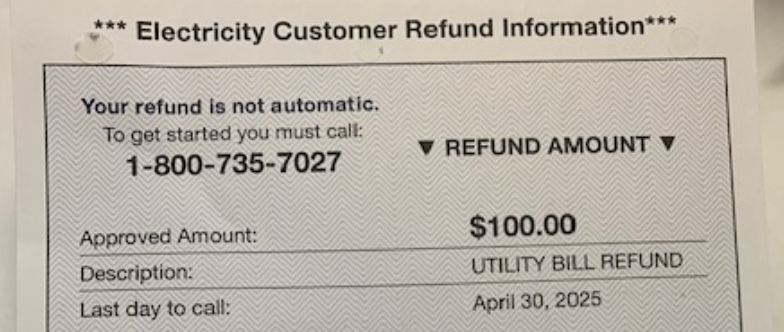Third-Party Suppliers Continue to Overcharge Massachusetts Electricity Consumers: In 2024, by $81 Million
In 2024, third-party “competitive” electric suppliers increased residential electric rates by $80.7 million,...
Back in the late 1990s, Massachusetts decided to allow companies, called third-party suppliers, to sell electricity directly to consumers. The theory was that free-market competition would drive down electricity rates as well-informed consumers efficiently made decisions. After a quarter century of allowing these third-party electric suppliers to sell electricity in Massachusetts, we know this hasn’t worked as planned for residential customers.
Despite the state essentially subsidizing third-party suppliers through everyone’s electric bills, most people don’t shop for electricity and the majority of residential shoppers lose money. The office of the Massachusetts Attorney General has produced several reports in recent years showing that consumers who have chosen their own electricity suppliers have paid $651.3 million more than if they had received Basic Service from National Grid, Eversource, or Unitil. That’s a big number to comprehend, and behind it are stories from real people.
We also know that third-party electric suppliers often operate less like honest businesses trying to offer a better product for less money and more like scams, trying to get as much money out of people as they can before the customer realizes what is happening. You don’t have to take our word for it. Earlier this year, Green Energy Consumers Alliance requested copies of customer complaints sent to the Department of Public Utilities in 2023 about 8 third-party suppliers. The Department removed identifying information from the documents and sent us 125 complaints from residential customers.
These complaints show supplier salespeople use deceptive, and sometimes straightforwardly fraudulent, tactics to sign up customers. Here is one complaint from a resident of Brookline:
| "I have an Eversource account. CleanChoice Energy sent me a flood of letters saying I should switch over. The letters had the Eversource logo on them, implying this was something associated with the company. After receiving a number of the letters, I called the number on the letter to see what this was and why I was receiving the letters. The person I talked to informed me that the city of Brookline was switching over the CleanChoice and therefore it would be required for me to complete the form or my power would be turned off...” |
That customer was lied to. In Massachusetts, utilities are required to provide default power, there will never be an instance when someone will be at risk of losing power if they do not switch to another supplier.
Here is a piece of confusing, to say the least, marketing material recently sent to one resident of Massachusetts.

Sometimes suppliers will get people’s contact information under false pretenses and then sign them up, as was described by this resident of Millbury:
| “I was approached by an Inspire salesman at the BJ’s store in Taunton, MA, a few weeks ago. I told him more than once that I only wanted information and I didn’t want to be signed up with Inspire. A week later, I received an email stating that our supplier has been switched to Inspire. I didn’t authorize this switch.” |
And here is an excerpt from complaint made by a resident of Belchertown, which was summarized by a DPU staff member:
| “[Customer] claims she was solicited "a year ago" at "a Walmart parking lot about saving money.. person only took my phone number and I decided no, I don't want this and left.. now I have a $1,500.00 balance!?.. called co and they can't provide me w/ proof/info of a switch?.. I never signed up for this!..” |
There was a similar case for a resident of Sherborn:
| “The document was not signed by me. It was a fraudulent document…Shut off date is 4-1-2023 and I am requesting to have my service remain on until I can resolve this dispute with Cleanchoice Energy and Eversource. The balance owed is over $6000. Please Help.” |
Once a customer is signed up, suppliers often move on to another next stage, dramatically increasing their customer’s rates, something suppliers are allowed to do because the state places no restrictions on what suppliers can charge.
Here is a DPU staffer member’s summary one complaint from a resident of Amherst:
| “[Customer] stated he looked at his bill closer b/c what used to be around $100 turned to $800. He called NGrid and was informed that Clean Energy, which used to charge $0.16/kwh, has been charging $0.59/kwh since November." |
And here is a similar report from a complaint from a resident of Brewster:
| “Nephew called on behalf of uncle who is 88 years old and on xed [fixed] income. He noticed that the bill was unusually high and found that supplier Clearview is charging $0.48/kwh.” |
And here is what one resident of Oak Bluffs wrote in a complaint against Inspire:
| “I was told I would have a lower rate for electricity than I had. I received my bill and it was almost 5 times the price I paid the previous month for my bill. I would never have switched with a rate that high.” |
And here is a DPU staff members summary of a complaint from a resident of Stoughton:
| “Summary of what cor wrote in Portuguese: "Since Sept '22 Ngrid had charged me about $119.99 for monthly elec servc...in Jan '23 another co (Inspire) got onto my acct and has been charging me $349.99?!!..This is a fraud...” |
There are more stories than we have space for in this blog. Like the complaint from a single mom who was on a payment plan before she learned she was signed up with Inspire. Or the person who called on behalf of their church when Clearview kept the church on as a customer even after they had been asked to drop the church as a customer. Or the many other customers who complained about suppliers' rapid price increases.
When pressed about the predatory practices, the industry, through the Retail Energy Advancement League (REAL), argues that these issues arise from always unnamed “bad apples” who give the mostly good suppliers a bad reputation.

But many of the complaints above are not from customers of small fly-by-night “bad apples” but from customers of large suppliers, some of which, like CleanChoice and Inspire (as a subsidiary of Shell), are also members of REAL. Predatory practices don’t seem to be the exception in this industry but the norm.
Recently, the Department of Public Utilities has begun considering reforms to the third-party supply market, including banning door-to-door marketing and automatic contract renewal. While we are taking part in these discussions and believe these reforms would help reduce the number of people being scammed, we would prefer the State House to also act on this issue. This is because, under current state law, the Department of Public Utilities is constrained in what it can do.
That is why Green Energy Consumers Alliance, along with dozens of other community and environmental groups, support An Act relative to electric ratepayer protections, H.3534 and S.2255. This bill would protect people from these predatory companies by prohibiting third-party suppliers from signing contracts with residential customers. This bill would not affect commercial or industrial customers or municipal aggregation programs, since these are areas where reforms to the electricity market have been more successful.
If you want to protect your community from these suppliers, please contact your State Representative and State Senator (you can find their email here) and ask them to support this legislation. If you get a response from your legislator, please let Carrie Katan know by email at carrie@greenenergyconsumers.org.
In 2024, third-party “competitive” electric suppliers increased residential electric rates by $80.7 million,...
This blog is a repost of a story that was produced by a partnership of the Boston Globe and WBUR. Published March...
Comments